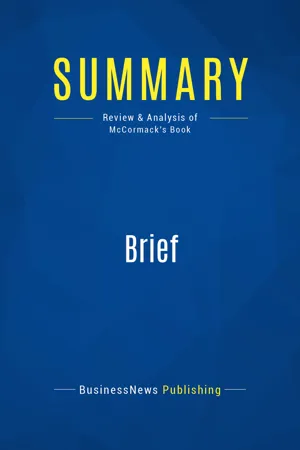
- English
- ePUB (mobile friendly)
- Available on iOS & Android
About This Book
The must-read summary of Joseph McCormack's book: `Brief: Make a Bigger Impact by Saying Less`.
This complete summary of the ideas from Joseph McCormack's book `Brief` teaches you how to get straight to the point by being concise, clear and brief. According to McCormack, being brief has become a crucial quality in society today. If being brief can and must be applied whenever possible, it is important to master the concept.
There are three main things to keep in mind to be systematically brief:
A - Awareness
D - Discipline
D - Decisiveness
Added-value of this summary:
• Save time
• Understand the importance of being brief as well as the key principles
• Increase your professional efficiency
To learn more, read `Brief` and learn how to say more by saying less!
Frequently asked questions
Information
Summary of Brief (Joseph McCormack)
AWARENESS Why now for brevity?
- People feel inundated – by a huge volume of emails, texts, magazines, blogs and television shows. It's almost like people are drowning in information.
- Everyone is having trouble focusing and prioritizing – the sheer volume of stuff that's out there tires people mentally and drains energy.
- Workers are getting interrupted more frequently – every 8 minutes according to one study. That's 50 to 60 interruptions in the typical 8-hour work day.
- Everyone is getting impatient – people just automatically expect things to happen faster.
- Cowardice
- Confidence
- Callousness
- Comfortable
- Confusion
- Complication
- Carelessness
- Cowardice – sometimes you're afraid to come right out and take a stand. You want to avoid being challenged to defend your stance.
- Confidence – you might prefer to keep talking so you can display your superior knowledgeon the subject.
- Callousness – you may be so self-centered you don't even respect your listener's time.
- Comfortable – you might feel you can take up lots of time because you know the other party well. At times, familiarity really does breed contempt.
- Confusion – you might be trying to think out loud so you keep chatting while you think.
- Complication – you might firmly believe there's so much stuff they need to know that you cannot give a direct answer.
- Carelessness – you might talk so much you end up going in circles and sending out mixed messages.
Table of contents
- Cover
- Title Page
- Book Presentation
- Summary
- About the Summary Publisher
- Copyright